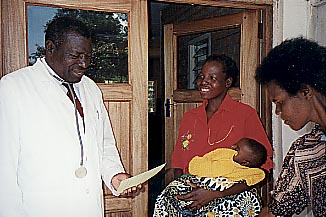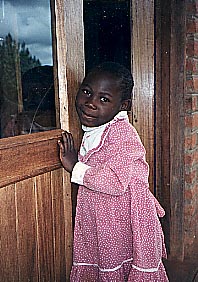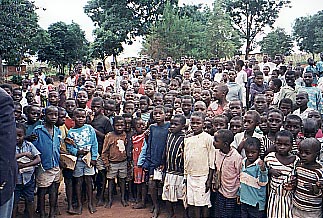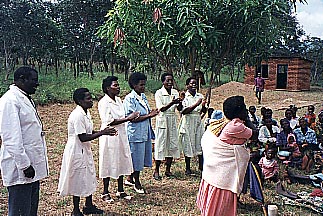- Where is Malawi?
May 28, 1997
I HAVE JUST RETURNED FROM AFRICA and bring you greetings from the Kasambala Medical
Centre in Nchenachena, Malawi. As some of you know, I traveled [see partial itinerary
to Malawi to visit with Dr. Trywell Nyirongo, (left on
photo)  his wife
Marilyn, and see the medical clinic they have established for the villages in this remote
section of northern Malawi.
his wife
Marilyn, and see the medical clinic they have established for the villages in this remote
section of northern Malawi.
It was a long, bumpy, dusty 6-hour drive north of the capital city Lilongwe to reach Trywell and Marilyn's home. The road was narrow, one lane each way, and in places seemed to have more potholes than tar. This became more of a problem as darkness fell, and we ended up with two bent rims when the car was swallowed by a particularly nasty part of the road that we didn't see until it was too late. I must admit to not being a very good lookout for Trywell, as I had a hard time keeping my eyes off the stunning display of stars in the sky. With absolutely no other lights with which to compete, the stars were beautiful.
We stopped along the way to buy vegetables from people along the roadside. Trywell tells me that everyone in the area collectively sets the same price, so there is no undercutting each other up and down the road. Otherwise, we stopped only for gasoline and Coca-Cola to wash down the Kudu biltong (dried meat) I brought along with me from South Africa. A bout 20 kilometers from their home, we turned west off the tar road onto a dirt road that immediately made me glad that we were in a four-wheel drive vehicle. There were several spots on this road where we had to come to almost a complete stop and then inch by very carefully. Fortunately, Trywell knew the exact location of these trouble spots. Perhaps they had been there for a while.
It was 8:30 by the time we arrived at Trywell's home. Luckily their generator was working so we had lights upon our arrival. They were the first lights I had seen in many miles and were a welcome sight. I would find out later, when Marilyn presented me with a flashlight, that the generator is shut down at bedtime, and there is no power again until the next nightfall. I was very tired from traveling all day, but Trywell had driven for over 12 hours in less-than-desirable conditions and still seemed to have energy reserves.
I presented gifts and greetings to Trywell and Marilyn from my family and others, and then one by one the children and the other occupants of their home came quietly into the living room to meet me. As is their custom, each kneeled before me, bowed their head and extended a hand to shake, their other hand placed gently in the crease of their right arm. At first they seemed very shy, but as I was to discover later, they are by custom very polite and respectful people and take greetings very seriously. In fact, at a reception held in my honor several nights later, I realized that they always greet people in this formal fashion when they visit each other's homes--the younger kneeling to the older.
The next morning Trywell went off early to the clinic to check on patients, and Marilyn
 took me on a walking
tour of the village. There were a number of small houses a short distance away but not
visible from each other due to the amount of trees and vegetation. They were all relatives
of Trywell's, although I could not always follow the genealogy. Trywell's homeland is a
beautiful area of gentle hills at the foot of the Nyika Plateau, a mountain that is often
covered with a mist. Their rains have been good so their crops, tobacco (which they sell),
maize, pumpkin, squash, rice, etc., were plentiful and the area was lush and green.
However, during periods of drought, there is no crop and the people suffer.
took me on a walking
tour of the village. There were a number of small houses a short distance away but not
visible from each other due to the amount of trees and vegetation. They were all relatives
of Trywell's, although I could not always follow the genealogy. Trywell's homeland is a
beautiful area of gentle hills at the foot of the Nyika Plateau, a mountain that is often
covered with a mist. Their rains have been good so their crops, tobacco (which they sell),
maize, pumpkin, squash, rice, etc., were plentiful and the area was lush and green.
However, during periods of drought, there is no crop and the people suffer.
When Trywell returned, it was time for us to go to the clinic, approximately 3/4 miles away, to unpack the medicines I carried with me from St. Paul. (We would meet with the expectant mothers and mothers with children five and under the next morning.) I watched as Trywell and Marilyn opened the large case, surveyed the new supply of antibiotics, and began to fill up the near-empty shelves of their secure pharmacy storeroom. They were grateful to everyone at Unity Church whose generous donations had provided these needed medical supplies. As I surveyed the room, I noticed several empty boxes addressed to Trywell in my handwriting. It was a poignant moment as I remembered packing those boxes months earlier in St. Paul and wondered if they would ever reach their destination.
We also visited the Rumphi satellite Clinic in the town of Rumphi, an hour's drive south. There Augustine Katumphika, the Medical Assistant-in-Charge, and Cullen Nyirongo, Trywell's younger brother who is a Medical Assistant with some ophthalmologist training, attend to patients on a full-time basis. The cases requiring the attention of a full medical doctor are referred to Trywell or to the regional hospital. Trywell plans to schedule time at this clinic once or twice a week, but he will continue to devote most of his time to the Kasambala Medical Centre and the people in the rural villages.
Trywell and Marilyn had organized a reception in my honor at their home that evening for 6:00 p.m. Luckily most people there operate on "Africa Time" which means different things to different people. Six o'clock can mean 6:30, 7:30, or even the next day, but it rarely means 6:00. When we approached the path to their house at 6:30, it was dark and the only light to welcome us was a paraffin lamp in their living room. As expected, only two guests had as yet arrived, and introductions were conducted by the soft glow of the lamp. Trywell soon got the generator running and we were able to see each other much better under the fluorescent ceiling light as the additional guests arrived.
After the formal introductions, I excused myself to help Marilyn in the kitchen, which is separated from the main section of the house by a covered breezeway where the water barrels are kept. The water, by the way, is carried up from the river in buckets and placed in the two barrels as needed. I had asked Marilyn if I could help cook their staple food, sime, cooked maize flour, which is very similar to sadza in Zimbabwe. Marilyn already had a pot of water heating on the wood cookstove. There was no burner, rather the pot sat recessed slightly in a hole. There was a lot of woodsmoke curling up from the open area where the wood is fed to the firebox, and it took a while for my eyes to stop watering.
Sime is not easy to cook your first time out, but I had a lot of encouragement from the women attending the reception, as well as some gentle teasing and jokes at my expense. However, I got the last laugh when I suggested to the women watching in the kitchen that they should come to America and try to cook a meal in my microwave. Later I realized what a good joke they thought it was when I heard it retold in their native language, Timbuku, with the only word I recognized being "microwave" followed by waves of laughter. We had become friends.
Later that night as we were all sitting around the living room eating together, I was honored by receiving high marks by the elder women for my attempt at cooking sime. I also received an African surname, Nyagondwe (pronounced Nah gond' way), from Kenneth Gondwe, a church board member and an elder of the area, to signify that I am accepted by the community and to remind me to visit again some day. That was quite an honor for me.
The next morning we visited the Nkhomboli Primary School. At 9:00 a.m., the children
and teachers were already assembled in the schoolyard waiting for us. About 650 pupils
from K-8 attend this school from all the surrounding villages, some walking great  distances. I asked
permission to tape them, and the students were excited that their voices would be
traveling to the United States for American school children to hear. The children sang
songs in their native Timbuku language, and some of the older children recited poems in
English. Photographing the children proved to be a bit difficult as they kept moving in
towards me and the camera. Everyone wanted to be in each picture.
distances. I asked
permission to tape them, and the students were excited that their voices would be
traveling to the United States for American school children to hear. The children sang
songs in their native Timbuku language, and some of the older children recited poems in
English. Photographing the children proved to be a bit difficult as they kept moving in
towards me and the camera. Everyone wanted to be in each picture.
Driving up the path to the Kasambala Medical Centre, I could hear voices singing a song of greeting for us. Approximately 75 women and their young children were assembled on the grass in back of the clinic. They were excited to have a representative of Unity Church visit them and bring greetings from the people who have been supporting them with the medical supplies they so desperately need. Their warm welcome moved me greatly, and I felt fortunate to be with them and to see first-hand the effects of our involvement.
After the children were weighed and given a quick check-up, anyone needing further attention would be seen later in the treatment room inside the clinic. Although the process seemed rather informal to me, everyone seemed to know what to do, and their needs were met. After visiting with each other briefly, the women went quietly on their way. Then it was time to see the pre-natal patients inside the clinic, where Trywell's wife Marilyn, a nurse/midwife, was busy examining the women and taking their blood pressure.
Since Trywell has provided prenatal care and immunizations and regular checkups for the
birth to five-year-olds in the villages, more children survive these critical early years
and are much healthier. Women now listen to the family planning songs sung on check-up
days and realize there is no longer a need to have a baby every year. Since AIDS has now become
a threat in this rural area, posters abound in support of condom use. In its effort to
provide more comprehensive medical care, the clinic now also has a trained dental
hygienist and a staff member with ophthalmology training.
Since AIDS has now become
a threat in this rural area, posters abound in support of condom use. In its effort to
provide more comprehensive medical care, the clinic now also has a trained dental
hygienist and a staff member with ophthalmology training.
Trywell showed me two other projects in progress. A church they are building now has the essentials--a roof and a few benches, and the doors and windows will be added as soon as possible. The church and clinic were purposely located within walking distance of the existing primary school so everything the villagers needed would be close at hand. In addition, their close proximity will help make bringing water to the buildings an easier task, and that is the second project currently underway. Large water storage tanks are being constructed into which water from the river will be pumped. With the help of a World Vision grant, the people of Nchenachena are finally going to have a gravity water system to serve their medical clinic and school. Even the children help, as they also did to build the clinic and the church. Each day after school, the children walk a few kilometers to pick up a load of plastic pipe, and then they carry it on their backs up the hill where it will eventually be connected to the water supply system. Trywell estimates that the system will be operational in about a month.
Here's even more good news. As a result of planning associated with this trip to Africa, I have been able to arrange to share a shipping container with another humanitarian relief organization serving a different part of Malawi at no cost to us. This means we will be able to ship larger, heavier and bulkier items that until now were not cost effective to send. Please check Trywell's wish list to see if you can provide any of the requested items. You can drop off the items at church now through July 1 (tentative cut-off date), or call Patty at 699-4793 to have the items picked up at your door.
Trywell, Marilyn, and the entire staff of the Kasambala Medical Centre send their special thanks and greetings to the members and friends of Unity Church-Unitarian. I will host an informal session at Unity in the Fall to tell you more about my visit to the Kasambala Medical Centre in Malawi and share slides, photographs, and stories, including taped greetings from the primary school children and the Centre's staff.
Thanks to all of you who have been contributing to this worthwhile project. A special thank you goes to the children of Unity Church, who once again have voted to donate a portion of the proceeds from the Christmas Pageant and their weekly chapel services to the Malawi fund.
Wish List
Blood Pressure Machine (desk style)
Oral Hygiene Equipment (scrapers, mirrors)
Otoscope (to check ears)
Dental Cartridges with Novocain
Eyeglasses (prescription & reading)
Toothbrushes/Toothpaste
Eye Ointments/drops
Patient Hospital Gowns
White, long-sleeved shirts (neck 17 +)
Blankets (twin-size)
Current Medical Books
Bed Sheets (twin size)
Children's Books (K-8th grade level)
Lined School Writing Paper